If you’ve ever been greeted by a burning smell when opening your dishwasher, you’re not alone. This alarming scent is a common concern for many homeowners. It’s not just an unpleasant odor; it can signal a potential hazard lurking in one of your most-used appliances. Understanding why this happens is crucial for both safety and maintenance.
Why Does My Dishwasher Smell Like It’s Burning? The burning smell from your dishwasher could be due to food particles stuck in the heating element, a malfunctioning motor, or a wiring issue. It’s essential to address this promptly to prevent potential fire hazards or further damage to your appliance.
The information in this blog will guide you through the common causes of a burning smell in dishwashers, along with practical steps to identify and resolve the issue. Whether you’re a DIY enthusiast or just seeking knowledge for better appliance care, this guide will provide valuable insights. Let’s dive into the reasons and solutions for that worrying burning smell in your dishwasher.
Common Causes: Why Does My Dishwasher Smell Like It’s Burning?

If you’ve ever been met with a troubling burning smell from your dishwasher, you’re not alone. It’s a common issue that can cause worry and confusion. In this section, we’ll dive into the usual suspects behind this fiery aroma.
I understand how alarming it can be when your dishwasher, usually a trusty kitchen ally, suddenly turns against you. Fear not! I’m here to guide you through the possible reasons why your dishwasher might smell like it’s burning, ensuring your kitchen companion gets back to its best, odor-free self.
Clogged Filters
Have you ever noticed a strange, burning smell coming from your dishwasher and wondered, “Why does my dishwasher smell like it’s burning?” Well, you’re not alone in this. One of the most common culprits behind this unnerving scent is a clogged filter.
Accumulation of Food Particles
Over time, food debris can accumulate in your dishwasher’s filter. This not only causes unpleasant odors but also can lead to a burning smell. The trapped particles can start to decompose, emitting a foul smell, and if they obstruct the filter, your dishwasher has to work harder, sometimes causing a burning scent.
Restricted Water Flow
When the filter is clogged, water can’t circulate efficiently. This means that your dishwasher isn’t cleaning as effectively as it should, and the lack of water movement can cause the motor to overheat. Think of it like trying to run a marathon while breathing through a straw – not so easy, right?
Increased Strain on the Dishwasher
A clogged filter forces your dishwasher to work harder than it should. This extra strain can lead to overheating of the motor and other components. It’s like when you’re overworked and stressed; you’re more likely to ‘burn out’.
Prevention Tips
To avoid this, regularly check and clean your dishwasher’s filter. This is a simple task that can save you a lot of headaches down the line. Imagine it as giving your dishwasher a little TLC – it’ll thank you for it by running smoothly and odor-free.
Blocked Pump Impeller
Ever wondered, “Why does my dishwasher smell like it’s burning?” Well, you’re not alone. This is a common issue many face, and it can be quite concerning. One of the primary culprits behind this unpleasant aroma could be a blocked pump impeller.
Impeller Location and Function
The impeller is part of your dishwasher’s pump assembly. It plays a critical role in circulating water throughout the machine. When it works properly, your dishes come out sparkling clean.
Blocking Culprits
Over time, food particles, glass shards, or even small utensils can find their way into the pump area, blocking the impeller. This obstruction can cause the motor to work harder, potentially leading to a burning smell.
Checking the Impeller
First, ensure your dishwasher is off and empty. You’ll likely need to remove the lower rack to access the pump area. Look for any visible blockages and carefully remove them.
Preventive Measures
To avoid future blockages, make sure to rinse dishes of large food particles before loading them. Regular maintenance checks can also be a game changer.
When to Call a Professional
If you’re not comfortable checking the impeller yourself, or if the problem persists after you’ve cleared the blockage, it might be time to call in a professional. They can provide a thorough check and resolve any underlying issues.
Faulty Thermostat
Have you ever caught a whiff of something burning and thought, “Why does my dishwasher smell like it’s burning?” If so, you’re not alone. This common issue can be perplexing and concerning. One potential culprit might be a faulty thermostat.
Thermostat’s Role
The thermostat in your dishwasher regulates the temperature during cycles. It’s like a mini-thermometer keeping an eye on the heat levels.
Overheating Issues
When the thermostat fails, it can’t accurately monitor the temperature. This malfunction may cause your dishwasher to overheat, leading to that alarming burning smell.
Detecting the Problem
You might notice your dishes are extra hot to the touch after a cycle, or the machine runs hotter than usual. These signs suggest a thermostat issue.
Safety First
An overheating dishwasher isn’t just about bad smells; it’s a safety hazard. You wouldn’t want a small issue to lead to something more serious, right?
Fixing the Fault
Don’t worry, it’s not all doom and gloom. Replacing a thermostat is straightforward and can be a quick fix. You can do it yourself with a bit of guidance!
Preventive Measures
Regular maintenance and check-ups can prevent such surprises. Just like you’d keep an eye on your car’s engine, giving your dishwasher a little TLC can go a long way.
When to Call a Pro
If you’re unsure about DIY repairs or if the problem persists, it’s wise to call in a professional. After all, peace of mind is priceless, when it comes to appliances in your home.
Wiring Problems
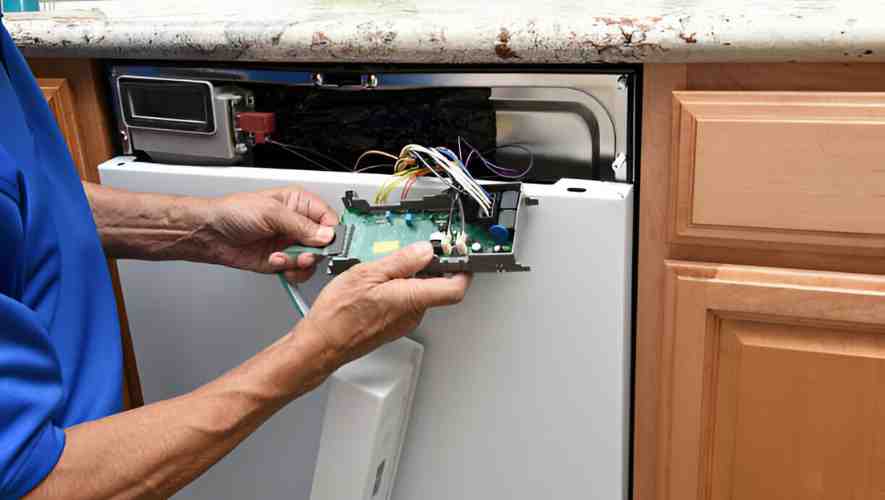
Have you ever wondered, “Why does my dishwasher smell like it’s burning?” It’s a common concern, and often, the culprit is a wiring issue. Let’s dive into what might be happening beneath the surface.
Remember, dealing with electrical components can be tricky, so it’s always wise to consult a professional if you’re unsure.
Damaged Wires:
Over time, the insulation around the wires can deteriorate. This exposes the wires, leading to short circuits or overheating, which produces that alarming burning smell.
Loose Connections:
If the wiring connections inside your dishwasher are not secured properly, they can create sparks. These sparks can burn surrounding materials, emitting a distinct burning odor.
Overloaded Circuits:
Dishwashers require a substantial amount of power. If your home’s electrical system can’t handle the load, it may cause the wires to overheat. This not only produces a burning smell but is also a potential fire hazard.
Faulty Components:
Sometimes, the issue isn’t with the wiring itself, but with components like the motor or the heating element. If these parts malfunction, they can cause the wires to overheat.
Improper Installation:
If your dishwasher wasn’t installed correctly, the wiring may be strained or bent in unnatural ways. This can lead to wear and tear, and eventually, a burning smell.
Overloaded Dishwasher
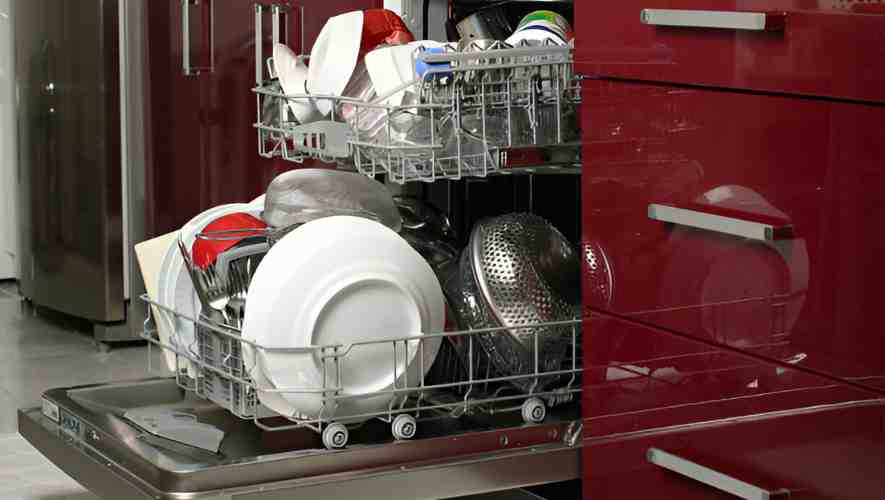
Have you ever noticed a strange, burning smell coming from your dishwasher and wondered, “Why does my dishwasher smell like it’s burning?” One common culprit could be an overloaded dishwasher. It’s a problem many of us face, On those busy days when we try to fit in just one more plate or spoon.
Let’s dive into why overloading can lead to that alarming odor.
Blocked Spray Arms:
Overloading can block the spray arms. If they can’t rotate freely, your dishes won’t get cleaned properly. Worse, the heating element might overwork and emit that burning smell.
Impaired Drainage:
Too many dishes can also hinder proper drainage. Water that can’t drain properly may cause overheating, contributing to the unpleasant odor.
Increased Pressure on the Motor:
An overloaded dishwasher puts extra pressure on the motor. When the motor strains, it heats up, potentially causing a smell that makes you think, “Why does my dishwasher smell like it’s burning?”
Hard Water Buildup
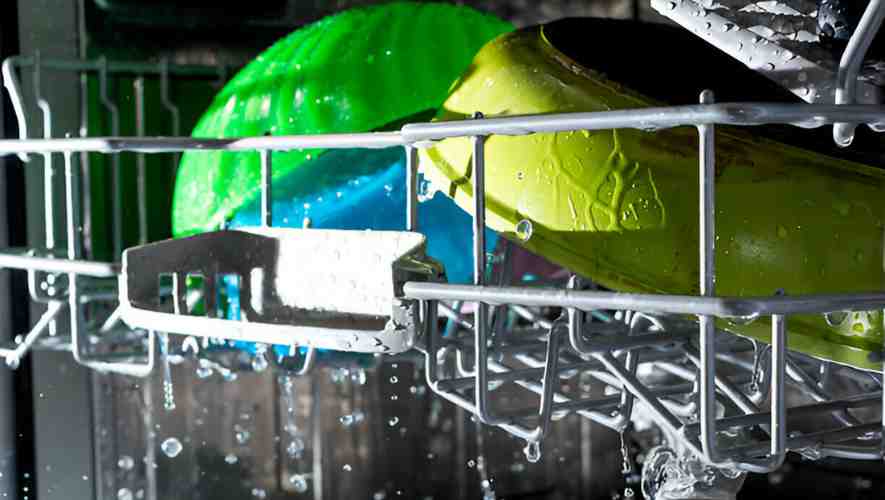
Have you ever noticed a strange, burning smell coming from your dishwasher and wondered, “Why does my dishwasher smell like it’s burning?” Well, you’re not alone. One common culprit behind this unnerving scent is hard water buildup.
Let’s dive into what this means for your beloved kitchen helper:
Mineral Deposits:
Hard water is rich in minerals like calcium and magnesium. Over time, these minerals accumulate inside your dishwasher, and around the heating element. This can lead to a burning smell during cycles.
Restricted Water Flow:
As the mineral deposits thicken, they can obstruct water flow. This not only affects the efficiency of your dishwasher but also increases the risk of overheating, which might cause a burning odor.
Impact on Dishwasher Components:
The buildup can stress your dishwasher’s components, the heating element. When covered in scale, it works harder and gets hotter, leading to a smell reminiscent of burning.
Cleaning Challenges:
Hard water can make it tougher for your dishwasher to clean effectively. Residues left on dishes might create an unpleasant odor if they get scorched during a hot cycle.
Melted Plastic or Foreign Objects
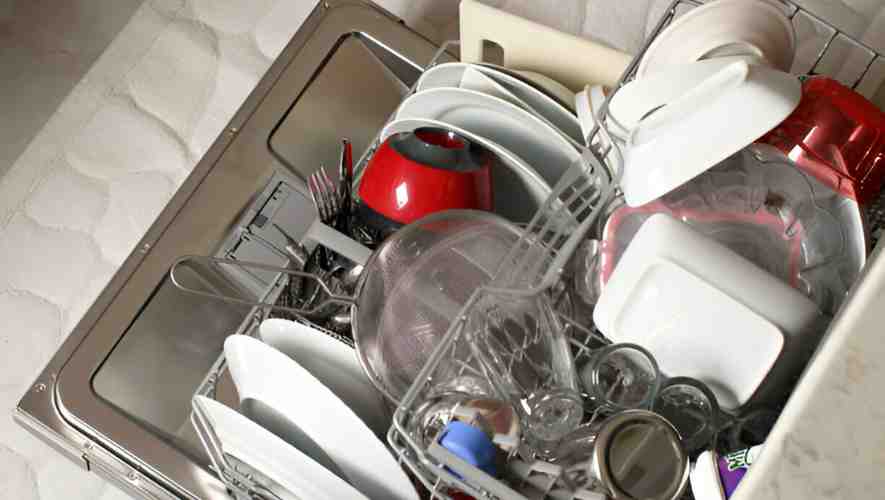
Have you ever caught a whiff of something burning and thought, “Why does my dishwasher smell like it’s burning?” Well, I’ve been there, and let me tell you, it’s not pleasant.
But don’t worry, I’m here to help you figure out what might be causing that unnerving scent. Often, it’s something as simple as melted plastic or a stray foreign object. Let’s dive into this a bit more:
Melted Plastic Items:
Sometimes, plastic items in your dishwasher can fall onto the heating element. When this happens, they can melt and give off a nasty burning smell. It’s easy to overlook a small plastic spoon or a container lid, so make sure to double-check your dishwasher’s layout before starting it.
Foreign Objects Stuck:
It’s not just about plastics. Any foreign object that shouldn’t be in your dishwasher can be a culprit. Maybe it’s a piece of food packaging or a forgotten utensil that slips through the racks. These items can burn or melt, contributing to that alarming smell.
Regular Checks Are Crucial:
I cannot stress enough how important it is to regularly inspect your dishwasher. Before loading your dishes, take a quick peek inside to ensure nothing is out of place. This small habit can save you from the worry and the nose-wrinkling odors.
Correct Loading Matters:
It might sound simple, but correctly loading your dishwasher can prevent a lot of issues. Ensure that plastic items are dishwasher safe and placed securely in the top rack. This small step can be a game changer in keeping your dishwasher smelling fresh and clean.
Damaged Heating Element
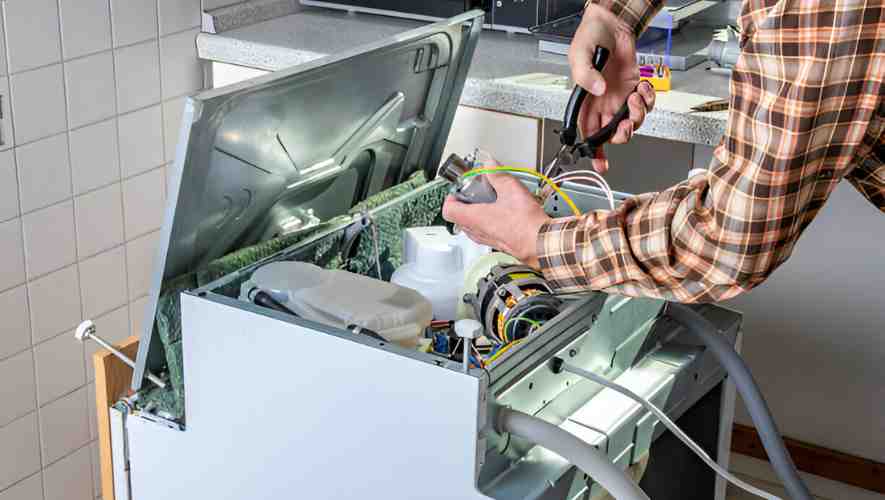
Have you ever wondered, “Why does my dishwasher smell like it’s burning?” Well, you’re not alone. It’s a common question and often, the culprit is a damaged heating element. This issue is more common than you might think, and understanding it can save you from unnecessary worry.
Let’s dive into the details.
Identifying the Problem:
The first sign of a damaged heating element is a distinct burning smell. This is different from the usual hot and soapy scent you might be used to. If your nose picks up something resembling burnt plastic or an electrical fire, it’s time to investigate further.
Causes of Damage:
Various factors can damage your dishwasher’s heating element. It could be due to age, overuse, or even a manufacturing defect. Sometimes, plastic utensils or small dish pieces fall onto the element and melt, contributing to the smell.
Risks Involved:
A damaged heating element isn’t just a smelly nuisance; it can be a safety hazard. It increases the risk of electrical faults and, in rare cases, might even lead to a fire. So, it’s crucial to address this issue promptly.
What You Can Do:
Firstly, if you suspect a damaged heating element, turn off your dishwasher and unplug it. It’s always better to be safe than sorry. Then, take a peek inside. Look for visible signs of damage like melting or warping on the element.
Getting Professional Help:
If you’re not comfortable handling this yourself, no worries! It’s perfectly okay to call in a professional. They can assess the situation accurately and suggest the best course of action, whether it’s repairing the element or replacing it altogether.
Overheated Motor:
Have you ever caught a whiff of something burning when running your dishwasher and thought, “Why does my dishwasher smell like it’s burning?” Well, you’re not alone. It’s a common issue that can set off alarm bells in any homeowner’s mind. One of the culprits behind this unnerving scent could be an overheated motor.
Lack of Ventilation:
If your dishwasher motor doesn’t get enough air, it can overheat. This is often due to blockages or a buildup of debris around the motor area.
Worn Bearings:
Over time, the bearings in the motor can wear out. This added friction generates extra heat, leading to that burning smell.
Electrical Issues:
Sometimes, the problem is a bit more complex, involving electrical components. Faulty wiring or malfunctioning parts in the motor can cause overheating.
Overuse or Age:
Like any appliance, dishwashers have a lifespan. An old or overly used dishwasher might have a motor that’s simply worn out from years of service.
Preventive Measures:
Regular maintenance is key. Ensure you’re cleaning the filters and checking around the motor area for any debris. If you’re not comfortable poking around, don’t hesitate to call in a professional.
Conclusion
To sum up, a burning smell in your dishwasher usually indicates trapped food particles, a malfunctioning motor, or electrical issues. Regular maintenance and prompt attention to such smells can prevent potential hazards and extend the life of your appliance.
In conclusion, it’s vital to take a burning smell in your dishwasher seriously. Regular cleaning, inspection, and professional maintenance can go a long way in preventing these issues. If you ever encounter such a smell, remember to act quickly to diagnose and address the problem. This ensures your safety and the longevity and efficiency of your dishwasher. Remember, a well-maintained appliance is a safe and efficient one!
